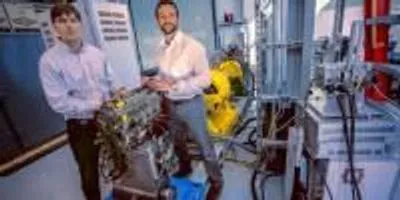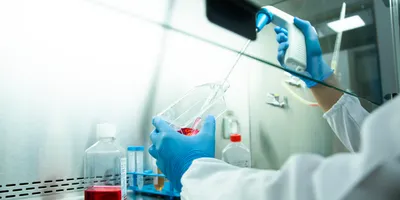 Benjamin Lawler (left) and Sotirios Mamalis (right) work on a proof-of-concept single-fuel RCCI engine at Stony Brook’s Advanced Energy Research and Technology Center.Photo courtesy of Stony Brook UniversityStony Brook, NY – October 15, 2015 – A Stony Brook University-led research team has received a $1 million grant from the Department of Energy (DOE) to conduct research on Reactivity Controlled Compression Ignition (RCCI), an emerging combustion technology which has the potential to simultaneously reduce fuel consumption and emissions. Research will focus on utilizing onboard fuel reformation to eliminate the need for two different fuels to enable RCCI.
Benjamin Lawler (left) and Sotirios Mamalis (right) work on a proof-of-concept single-fuel RCCI engine at Stony Brook’s Advanced Energy Research and Technology Center.Photo courtesy of Stony Brook UniversityStony Brook, NY – October 15, 2015 – A Stony Brook University-led research team has received a $1 million grant from the Department of Energy (DOE) to conduct research on Reactivity Controlled Compression Ignition (RCCI), an emerging combustion technology which has the potential to simultaneously reduce fuel consumption and emissions. Research will focus on utilizing onboard fuel reformation to eliminate the need for two different fuels to enable RCCI.
The DOE grant to Stony Brook is one of eight awarded to research teams around the country investigating advanced vehicle technologies. According to the DOE, the funding goes toward projects that “pursue breakthrough approaches to providing Americans with greater freedom of mobility and energy security, while lowering costs and reducing environmental impacts.” The DOE is providing a total of $10 million in funding to the eight projects, each of which focuses on innovative solutions for efficient and environmentally friendly vehicle technologies to reduce petroleum use in the U.S.
Related article: New Method Provides Nanoscale Details of Electrochemical Reactions in Electric Vehicle Battery Materials
“National laboratories and academia have extensively researched RCCI for a decade due to its potential, and the benefits for improved fuel efficiency and reduced emissions are well-documented,” said Benjamin Lawler, PhD, Principal Investigator and Assistant Professor in the Department of Mechanical Engineering at Stony Brook University. “However, the added cost and complexity of using two fuels has stalled industry interest in RCCI. We hope to discover an efficient and cost-effective way to employ RCCI combustion using one fuel.”
Professor Lawler and Professor Sotirios Mamalis proposed the use of an onboard fuel reformer to create the necessary fuel reactivity separation to enable RCCI via a single fuel. If successful, the proposed use of an onboard fuel reformer could be a major step for future commercialization of RCCI.
Related article: Researchers' Discovery in Alternative Energy Production may be Breakthrough for Hydrogen-Fueled Vehicles
The research team is testing three possible parent fuels with potential for automotive applications at Stony Brook’s Advanced Energy Research and Technology Center. These fuels are gasoline, diesel and natural gas.
In addition to experimental testing of the fuels and fuel reformates, Computational Fluid Dynamics (CFD) modeling and simulation of parent fuel-reformate RCCI will provide insight into fuel pairs that offer the most promise for efficiency. The goal will be to evaluate each fuel pair and its ability to enable single-fuel RCCI.
Co-Principal Investigators on the project are Sotirios Mamalis, PhD, Assistant Professor in the Department of Mechanical Engineering, and Dennis Assanis, PhD, Professor of Mechanical Engineering, and Provost and Senior VP of Academic Affairs at Stony Brook University. Other participants in the research include Dr. Marco Castaldi of the City College of New York, and Dr. Dean Modroukas of Innoveering, LLC.
Stony Brook, NY – October 15, 2015 – A Stony Brook University-led research team has received a $1 million grant from the Department of Energy (DOE) to conduct research on Reactivity Controlled Compression Ignition (RCCI), an emerging combustion technology which has the potential to simultaneously reduce fuel consumption and emissions. Research will focus on utilizing onboard fuel reformation to eliminate the need for two different fuels to enable RCCI.
To continue reading this article, sign up for FREE to

Membership is FREE and provides you with instant access to eNewsletters, digital publications, article archives, and more.












